|
|
|
Sort Order |
|
|
|
Items / Page
|
|
|
|
|
|
|
| Srl | Item |
| 1 |
ID:
175154


|
|
|
|
|
| Summary/Abstract |
Some scholars in International Relations and comparative politics continue to debate how to obtain the strongest explanatory theory whereas others hold that each approach should be treated as its own area of research. Both of these groups tend to agree that factors from across paradigms cannot be coherently combined with each other. On the contrary, Sil and Katzenstein have argued for analytic eclecticism in scholarship, which would not treat research traditions or paradigms as strict limitations on theory construction. Inspired by pragmatism, they have made a compelling case that considerations of usefulness and knowledge cumulation are more important than paradigmatic fidelity. This forum examines analytic eclecticism from the points of view of neo-empiricism, feminism, and interpretive constructivism, followed by a reply by Sil. A decade has passed since the publication of Sil and Katzenstein’s Beyond Paradigms, so it seems appropriate to reflect upon the strengths and weaknesses of analytic eclecticism.
|
|
|
|
|
|
|
|
|
|
|
|
|
|
|
|
| 2 |
ID:
117915
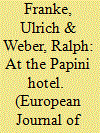

|
|
|
|
|
| Publication |
2012.
|
| Summary/Abstract |
Pragmatism is ever more popular amongst those who study international relations. Its emphasis on practice is generally acknowledged as a defining characteristic. There is, however, a general tension within pragmatist thought concerning practice, for pragmatism may emphasize the theorizing of practice. It is, then, distinguished from other theories in International Relations (IR) such as neo-realism or constructivism as a contender in their midst. We delineate a pragmatist theory of IR in the first part of this article, but insist on going beyond merely establishing the next paradigm, for pragmatism may also emphasize the practice of theorizing. Theories are, then, considered different tools useful for dealing with the social world. This will be corroborated in the second part by a close reading of William James. Finally, we submit that instead of a paradigm war, a metaphor such as that of the Papini hotel is needed in IR - a metaphor that accounts for theory competition without neglecting the limitations set by the practice of theorizing itself.
|
|
|
|
|
|
|
|
|
|
|
|
|
|
|
|
| 3 |
ID:
113805
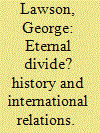

|
|
|
|
|
| Publication |
2012.
|
| Summary/Abstract |
On one level, history is used by all parts of the International Relations (IR) discipline. But lurking beneath the surface of IR's approach to history lies a well-entrenched binary. Whereas mainstream positions use history as a means to fill in their theoretical frames (seeing history as a kind of 'scripture' of abstract lessons), many post-positivists reduce history to a pick-and-mix of contingent hiccups (a 'butterfly' of what-ifs and maybes). Interestingly enough, this binary is one reproduced throughout the social sciences. As such, there is a bigger story to the apparently 'eternal divide' between history and social science than first meets the eye. This article uses the various ways in which history is used - and abused - in IR to probe more deeply into the relationship between history and social science as a whole. This exploration reveals four frameworks, two drawn from history (context and narrative) and two drawn from social science (eventfulness and ideal-typification) which illustrate the necessary co-implication of the two enterprises. The article employs these tools as a means of re-imagining the relationship between history and social science (including IR), conceiving this as a single intellectual journey in which both are permanently in view.
|
|
|
|
|
|
|
|
|
|
|
|
|
|
|
|
| 4 |
ID:
098443
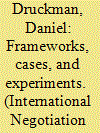

|
|
|
|
|
| Publication |
2010.
|
| Summary/Abstract |
A theory-oriented approach to teaching and training about negotiation is discussed in this article. Following the flow of a course taught on several continents, I emphasize the value of conceptualizing about the negotiating experience. This is done with concepts, metaphors, frameworks, and research findings summarized in the form of a set of narratives. A series of exercises bring the concepts to life. These include the difference between negotiating values and interests, designing scenarios, and enacting the negotiating functions of analyst, strategist, and designer. Students are also given an opportunity to perform as negotiators and observers in a complex multi-issue negotiation involving security issues similar to those discussed recently between the U.S. and Iraq. They are provided with a research experience that entails coding selected peace agreements for distributive and procedural justice as well as for the durability of those agreements. Lessons learned are generated in de-briefings of the exercises. They are also discussed in a final class where students' insights, gained from comparative case analyses, are organized by the framework introduced during earlier classes.
|
|
|
|
|
|
|
|
|
|
|
|
|
|
|
|
| 5 |
ID:
159463
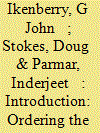

|
|
|
|
|
| Summary/Abstract |
The Trump presidency appears to personify, along with Britain's vote to withdraw from the European Union, a sense of deep crisis in the United States-led liberal international order (LIO). The two states that conceived and constructed a whole array of international institutions after 1945 now seem to be rejecting that order, or at the very least, demanding that its institutions either be reformed or recalibrated to better suit their purposes. However, both developments may signal a new phase in the evolution of the international system—more nationalistic, state-centric and transactional, in which costs and responsibilities are more widely shared and where the electorate questions the costs versus benefits of the postwar liberal consensus. This crisis has long been evident
|
|
|
|
|
|
|
|
|
|
|
|
|
|
|
|
| 6 |
ID:
156943
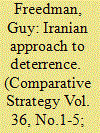

|
|
|
|
|
| Summary/Abstract |
Conventional wisdom holds that Iran has no formal doctrine of deterrence. Certain deterring agents have been identified, but these are incomplete and have not been organized as a whole to fully depict Iran's approach to deterrence. This article brings forward original Iranian literature in Farsi and presents Iran's definition and doctrine of deterrence: Altering the thought process of an enemy using inconspicuous threats, in order to remove external threats to Iran's security and independence. Understanding Iran's theory of deterrence is important both to policymakers and academics given the strategic interaction with Iran in recent years and in the future.
|
|
|
|
|
|
|
|
|
|
|
|
|
|
|
|
| 7 |
ID:
060823
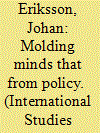

|
|
|
| 8 |
ID:
154808


|
|
|
|
|
| Summary/Abstract |
In the process of bringing together this special issue of the Australian Journal of International Affairs, we were struck by how frequently the term ‘national security’ is used and abused, by both academics and policymakers. Some use it to refer to conventional statist threats. Others employ it as a broad catch-all for anything that may create or imply harms against anyone in a particular polity. Still others use the term to justify an array of populist and politicised policy choices with apparently little to justify the link between the threat and the referent object—that is, the thing being secured.
|
|
|
|
|
|
|
|
|
|
|
|
|
|
|
|
| 9 |
ID:
159096
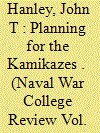

|
|
|
|
|
| Summary/Abstract |
Repeated operational gaming provides an unparalleled technique for predicting factors governing
battles and campaigns and anticipating reasonable actions, thereby better informing operational
planning, force allocation, and force development
|
|
|
|
|
|
|
|
|
|
|
|
|
|
|
|
| 10 |
ID:
183862
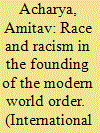

|
|
|
|
|
| Summary/Abstract |
While race existed as a cultural marker in earlier history, a mutually-reinforcing link between racism, slavery and empire is a distinct product of western Europe and the US-led world order. Yet, mainstream scholarship on International Relations has obscured the question of race or worse, legitimized its exclusion in discussions of world order-building. At the same time, demand for racial equality from anti-colonial forces presented an alternative and inclusive conception of world order. The first part of this article offers a brief discussion of concepts of race, racism and world order. The next part examines how racist ideas and norms created exclusionary frameworks and approaches of world order, such as the European ‘standard of civilization’ principle. The third part looks at the role of racism in the emergence of the American-led world order, including US President Woodrow Wilson's rejection of the ‘racial equality’ principle in the League of Nations Charter, the privileging of ‘sovereign equality’ over ‘racial equality’ in the UN Charter, and the scant attention given to the link between colonialism and denial of human rights in the Universal Declaration of Human Rights. Yet, anti-colonial leaders and conferences, especially the 1955 Bandung Conference, integrated ‘national sovereignty, racialism and colonialism’, and demanded racial equality as a fundamental human right. The final part cautions against the dangers of complacency and compartmentalizing the study of race and racism, and calls instead for viewing racism as an inter-linked global challenge, hence integral to the emerging research agenda of Global International Relations.
|
|
|
|
|
|
|
|
|
|
|
|
|
|
|
|
| 11 |
ID:
139673
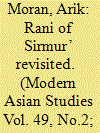

|
|
|
|
|
| Summary/Abstract |
In ‘The Rani of Sirmur: An Essay in Reading the Archives’, Gayatri Chakravorty Spivak offered a literary analysis of British records to demonstrate the inextricability of language from the colonial/imperial project’s goal of world domination. Honing her arguments on the threat of a Himalayan queen (rani) to ‘become sati’ (i.e. immolate herself), Spivak interpreted the event as
representative of the plight of subalterns and of ‘third world women’ in particular. However, a close reading of the records reveals profound discrepancies between Spivak’s interpretation and conditions that existed in and around the kingdom at the time. This article contextualizes the rani’s story by supplementing archival sources with folk traditions, local histories, and recent research on sati and Rajput women. It shows that the rani was actually an astute ruler, similar to her peers in the West Himalayan elite, and that her threat of suicide resulted from reasons
that go beyond an alleged attempt at recovering agency from the dual oppressions of patriarchal indignity and an invasive superpower. The discourses about sati in contemporary texts are also investigated, revealing a considerable overlap in South Asian and European views of sati among Himalayan elites in turn-of-thenineteenth-century northwest India.
|
|
|
|
|
|
|
|
|
|
|
|
|
|
|
|
| 12 |
ID:
123053
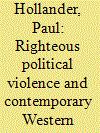

|
|
|
|
|
| Publication |
2013.
|
| Summary/Abstract |
Modern political violence has been increasingly preceded or accompanied by elaborate ideological justifications, devised, in part, by intellectuals motivated by their own political beliefs and commitments. Many idealistic intellectuals have been especially sympathetic toward political movements and systems that have promised to carry out far-reaching social transformations. These movements and systems have often relied upon violent means to accomplish their goals. The political partisanship of many Western intellectuals necessitates a revision of their idealized conception. These issues are dealt with in the context of the intellectuals' attitudes toward Nazism, communism, and present-day Islamic radicalism.
|
|
|
|
|
|
|
|
|
|
|
|
|
|
|
|
| 13 |
ID:
124913
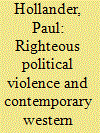

|
|
|
|
|
| Publication |
2013.
|
| Summary/Abstract |
Modern political violence has been increasingly preceded or accompanied by elaborate ideological justifications, devised, in part, by intellectuals motivated by their own political beliefs and commitments. Many idealistic intellectuals have been especially sympathetic toward political movements and systems that have promised to carry out far-reaching social transformations. These movements and systems have often relied upon violent means to accomplish their goals. The political partisanship of many Western intellectuals necessitates a revision of their idealized conception. These issues are dealt with in the context of the intellectuals' attitudes toward Nazism, communism, and present-day Islamic radicalism.
|
|
|
|
|
|
|
|
|
|
|
|
|
|
|
|
| 14 |
ID:
156823
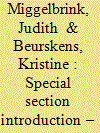

|
|
|
|
|
| Summary/Abstract |
This thematic section is dedicated to the discussion of conceptual and practice-inspired approaches to the entanglement of sovereignty and borders. The production of this thematic section is accompanied by an astonishing amount of uprising public debates on sovereignty: the so-called ‘Brexit’, the so-called ‘Muslim ban’, debates about stricter border controls, extraterritorial detentions camps and more restrictive asylum policies in the run-up to elections in some European countries indicate that sovereignty itself has become a topic of public concern. And it is not just sovereignty that concerns people and politicians, but a perceived loss of sovereignty by the nation-state and a necessity to regain and strengthen it. The newly sparked interest in sovereignty revolves around issues of security, border and migration control, access to resources and social security systems as well as questions of finance. Though there has always been a good amount of scepticism regarding security issues versus open borders
|
|
|
|
|
|
|
|
|
|
|
|
|
|
|
|
| 15 |
ID:
159921
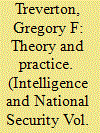

|
|
|
|
|
| Summary/Abstract |
A sometime practitioner reflects on how theory might help address the challenges of doing intelligence: balancing strategic and tactical; knowing when ‘stories’ have been overtaken; understanding intelligence–policy relations in ways more subtle than ‘politicization’ adapting to big data; rethinking the canonical, and no longer helpful ‘intelligence cycle’; collaborating more with the private sector; and perhaps hardest, dealing with ‘false facts’.
|
|
|
|
|
|
|
|
|
|
|
|
|
|
|
|
| 16 |
ID:
175644
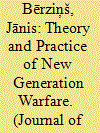

|
|
|
|
|
| Summary/Abstract |
By employing well-known methods of warfare, but in innovative ways and with the help of new technologies, Russia’s concept of operations in Crimea and Eastern Ukraine took many in the West by surprise. Almost immediately, Western analysts embarked on a search for definitions for this ‘new’ approach, most of them within the West’s own theoretical framework. These have included the Gerasimov Doctrine, hybrid warfare and hybrid threat, non-linear warfare, fourth-generation warfare, and most recently ‘gray zone’ conflict. Nevertheless, a vast volume of Russian theoretical debates about new ways of warfare has remained under-studied. This has resulted in misconceptions in the characterization of Russian strategy, through molding it to fit Western theoretical constructs as opposed to those within which it was developed. Rather than helping assess the real options open to Russia, each of the aforementioned terms has tended to be unhelpful, as none reflects Russia’s doctrine or assumptions about the nature of war in the 21st century. This article’s main aim is to describe the Russian way of ‘sub-threshold warfare’ as defined by Russia itself. This was done by researching more than 30 years of Russian military literature, case studies from Crimea and Eastern Ukraine built from interviews with Ukrainian military and security personnel, and information on the Syrian case based on Russian sources. An analysis of the Russian military literature when compared to the empirical evidence of Russian tactics in Ukraine and Syria shows that its strategy is multi-layered and comprehensive. It is counterproductive to frame the Russian strategy within artificial frameworks established outside of the threat context, such as Hybrid Warfare. The Russians have their own framework that, although influenced by Western military doctrine, is the result of their own theoretical developments.
|
|
|
|
|
|
|
|
|
|
|
|
|
|
|
|
| 17 |
ID:
189880
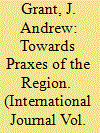

|
|
|
|
|
| Summary/Abstract |
While both formal and informal regionalisms examine the political ramifications of economic flows of capital, goods, and people, there is a blurring of such conceptual dichotomies in practice. Hence, in order to offer a more accurate account of the distinctions and overlap between the formal and informal – and to rectify the tendency to overlook the agency of African state actors and non-state actors – this article offers an agential constructivist approach that seeks to advance a praxis – or praxes – of the region. To that end, the article advances the concept of bifurcated interregionalisms as a means of analyzing cases of regional dynamics and regionalisms in Southern Africa and East Africa. The article concludes by offering some reflections on the future of regionalisms in an emerging global order in flux whereby illiberal and xenophobic variants of regionalisms compete with the liberal and cosmopolitan versions.
|
|
|
|
|
|
|
|
|
|
|
|
|
|
|
|
|
|
|
|
|